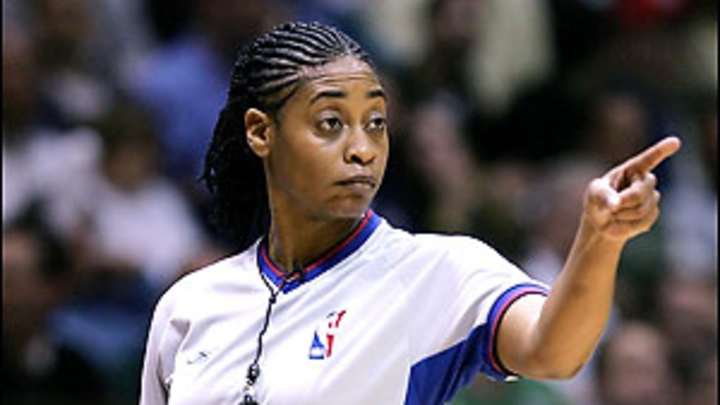'She's not bad'


The best referees go unnoticed, but that seems to be a daunting task in today's NBA. Incidents such as the one on April 15 when veteran official Joe Crawford ejected a benched Tim Duncan for laughing achieve the very opposite of this.
But Thursday night during the Pistons' 93-77 win over the Magic in Game 3, Violet Palmer's presence on the court was barely registerable, depite five technical fouls called during the game. That she was the only woman chasing players up and down the Amway Arena floor in Orlando seems unremarkable when, in truth, it's anything but.
Rounding off her 10th NBA season, Palmer, 42, remains the sole woman among the league's 59-member officiating staff and the lone female ref in any of the four major professional sports. Still, "It doesn't feel like I've arrived," she says. "I have to keep working harder."
Thursday's game, in which Detroit improved its series lead to 3-0, marked Palmer's second career postseason assignment -- a milestone that speaks to the confidence she's earned from her superiors.
"We knew that Violet was a dependable and conscientious referee," says NBA director of officials Ronnie Nunn, adding that she could see more action in this year's playoffs. "Now people say of Palmer what you hear of most refs who've 'got it': 'You know, she's not bad.' "
Though she has found acceptance within the NBA's predominantly male ranks, the derision that marked her formative years as a league official has not completely died out. The loudest and most recent reminder came last February at a Rockets-Celtics game. When Palmer made a call early in the contest that rankled Boston radio analyst Cedric (Cornbread) Maxwell, a former Celtic, he blurted out -- on-air -- for her to "get back in the kitchen ... and fix me some bacon and eggs."
The resultant public outrage over Maxwell's comments -- Imus-esque in their antiquity -- eventually compelled him to apologize. But in hindsight his remarks seem more baseless than boorish. "I really don't think he put much thought into it," Palmer says.
Truth is, Palmer has always been one of the guys -- from her playground days growing up in Compton, Calif., to now. Beyond her own private locker room, she's afforded no special treatment. She wears the same uniform (albeit with some minor tailoring to fit her proportions), works the same hectic schedule (10 to 11 games a month) and, today, commands the same respect from players and coaches as her male counterparts.
"As a player, I felt her first year she really wasn't going to make it," says Steve Kerr, a 15-year NBA veteran who's now a TNT analyst. "She definitely got better to the point where in the end of my career, she was just another one of the officials."
Reaching that point took some time, though. When Palmer broke into the league in 1997 along with Dee Kantner, most wondered whether the women could survive in such a chauvinistic environment. Early concerns centered on the women's fitness (can they keep up?), sensitivity to language (can I curse?) and the protocol for paying a compliment (can I pat 'em on the rear?).
The female referees weren't well received to start. Tim Hardaway pronounced their hiring a "horrible" idea, while Kenny Anderson worried of being sexually objectified. (In 1998 he famously directed Kantner to watch the game and not his pants.)
None of the initial conjecture considered how the refs' femininity might work to their advantage -- particularly Palmer's unique credentials as a black woman from the inner city. "I think players can identify with a strong woman," Palmer says. "They're like, 'She reminds me of a sister or a mother.'"
Palmer's street cred is legit too, if slightly more stable than most Comptonites. Her parents, James and Gussie have been married for almost 60 years and have lived in the same house for nearly the past 50. (It's fabled to be the only one in Compton with a white picket fence.) Dinner after Sunday service remains a proud family tradition. Basketball, too. James, a retired furnace operator, played in college; Gussie, a homemaker, played in high school. Violet's younger brother, Rod, coaches at Compton's Centennial High. Violet's nephew, Wun Versher, was a Harlem Globetrotter.
Violet grew up playing football, basketball and was a perennial all-star on her all-male Little League teams. "You know how some girls would probably be the last one to be picked in the playground?" Rod Palmer says. "She was always the first."
On Oct. 31, 1997, Violet Palmer because the first woman to officiate an NBA game. But while a decade's worth of work has solidified her own credentials, it hasn't exactly filled the ranks of officiating with more women; progress remains slow in that area.
Kantner, her trail-blazing partner, was fired for substandard performance in 2002. (She's now the WNBA's supervisor of officials.) Just 19 other women work under league banner today: 14 in the WNBA, five in the NBA Development League.
Asked if she sees herself officiating long enough to become the crew chief of an all-female team, Palmer is dubious. "I think I will get an opportunity to be a crew chief," she says, "but as far as me working with other women, I really have no idea."
Ironically, what her unobtrusive profile gives them instead might be far more notable: a chance.
